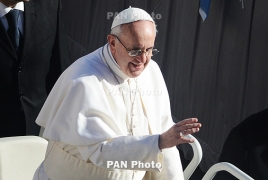Top 10 Images From Pope Francis' Journey to the Philippines - Aleteia
In my experience attending corporate training programs — especially those involving team dynamics and motivation approaches — I have always been impressed with the way the really good trainors are able to create a euphoric pumped-up vibe in the participants over the course of the session. The courses that are conducted away from the office over several days are particularly effective as they also create a community spirit amongst the participants in the program. Not surprisingly we come out of such training programs carrying with us that ‘high’ that supposedly will fuel a change in behaviour for the better.

Key challenge for Filipinos is to find lasting meaning in the recently-concluded papal visit.
(Photo source: USA Today)
Those trainors certainly are worth the big bucks they’re paid. And it’s good money — considering they are not accountable for what happens to their training subjects after they leave the nest. It is really up to the boss — or whoever forked out company money to have their employees trained in an expensive course — to ensure that the expected outcomes of the investment are met by actual results.
Scale this up to a national level and you get an idea of the expectations now resting on Filipinos in the aftermath of the visit of Pope Francis. Tax money as well as the enormous costs to do with disruptions to business all over the country thanks to the security measures and holidays effected during the papal visit have been incurred. Even more to the point, Filipinos and their top opinion-shapers, have waxed heavenly poetry over how the pope has “inspired”, “unified”, “uplifted”, and “blessed” Filipinos during his brief stay.
The bottom line, if we are to believe all this, is that Pope Francis’s presence in the Philippines over the last few days brought about “a renewed sense of hope” among Filipinos.
Hope in what exactly? Well, that depends on the answer to this question:
Will the costs incurred by the papal visit be capitalised? Or will they merely be written off?
Excuse for now the accounting-speak but this is worth bearing in mind. When you capitalise a cost, you do so recognising that a lasting asset was created. When you write off a cost, you recognise that there will be no significant legacy left by the outcome of said expense over the foreseeable future.
What exactly is the tangible asset that Pope Francis will be leaving behind in the Philippines? To be sure, he did not build a factory that will employ a hundred thousand Filipinos over the next 20 years. So far, too, there is no evidence that he has implemented any significant reforms in the Philippines’ Roman Catholic leadership that would change the primitive way Catholicism is imparted on the majority Catholic population. And neither did the pope commit to some kind of economic treaty that could contribute to the country’s development.
Of course, none of those are things that could be reasonably expected of a visiting pope. Pope Francis, after all, came as a spiritual leader, not a diplomatic Santa Claus. What the Pope will have supposedly achieved is to contribute to the spiritual enrichment of Filipinos. In short, Filipinos, in theory, will have come out of the experience spiritually wealthier. The legacy left by the pope is expected to be an intangible spiritual wealth.
So are Filipinos wealthier in spirit following this momentous papal visit?
That is the 100 million-peso question. Much the same way defenders of the extravagant “royal wedding” of Filipino starlets Dingdong Dantes and Marian Rivera like to point out that such spectacles serve an important purpose in society — to deliver a similar spiritual experience to their legions of fans in the form of momentary distractions from their wretchedness, the pope’s legacy is a similarly euphoric state. And we all know how long those things last.
The challenge therefore is for Filipinos to make the Pope Effect last. To be sure, millions of Filipinos saw the pope and shared the experience of being in his holy presence as a community. The question in this light, however, is a bit more confronting:
Did Filipinos actually hear what he said?
There are many rock stars who write great meaningful lyrics. The trouble with their fans is that they hear the music but not the words. Pope Francis certainly earned the distinction as the modern-era’s rock star pope. His Philippine visit affirmed that title. The thing with rock’n roll is that it is best experienced with sex and drugs. But, as my colleague Paul Farol pointed out, “The worst time to tell a person he’s an alcoholic is while he’s drunk.” The key lesson, therefore, is that the wealth in the pope’s visit lies in the messages he brings supposedly as God’s earthly vassal. Hopefully, Filipinos listened.
So perhaps we will wait out the next 100 days following this momentous occasion and review in hindsight what the papal visit really meant to Filipinos.





